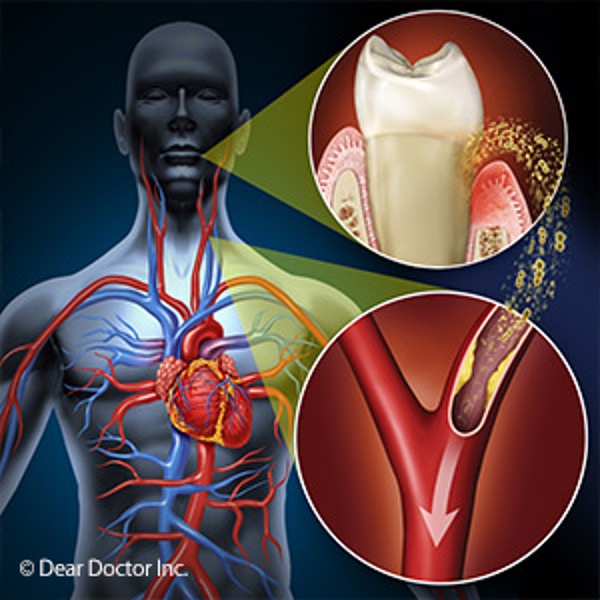When it comes to heart health, most people think of factors like diet, exercise, and cholesterol levels. However, research has identified a surprising connection between oral health and cardiovascular disease.
In this issue, we will discuss that unique connection between the health of your gums and heart disease.
Your gums—the soft tissue that surrounds and supports your teeth—can serve as a predictor of heart disease. This link between gum health and heart health is a critical reminder that taking care of your mouth is about more than just a bright smile; it’s about protecting your heart.
Periodontal disease, commonly known as gum disease, is an infection of the tissues that hold your teeth in place. It’s primarily caused by poor oral hygiene, which leads to plaque buildup on the teeth. If left untreated, this plaque can harden into tartar, which can only be removed by a dentist or periodontist. Over time, this leads to inflammation of the gums, known as gingivitis. If gingivitis is not addressed, it progresses into periodontitis, a more severe form of gum disease that can result in tooth loss.
So, what does this have to do with your heart? Research suggests that the inflammation caused by gum disease can have a significant impact on your cardiovascular system. The bacteria in your mouth from gum disease can enter your bloodstream, triggering inflammation throughout the body, including in the arteries. This inflammation can contribute to the development of atherosclerosis, a condition where the arteries become clogged and hardened, which is a leading cause of heart attacks and strokes.
Several studies have supported the connection between gum disease and heart disease. For example, a study published in the Journal of the American Heart Association found that people with periodontal disease were nearly 50% more likely to suffer from heart disease compared to those with healthy gums. Another study in the European Journal of Preventive Cardiology indicated that patients with gum disease had a higher risk of developing cardiovascular issues, including heart attacks.
The exact mechanisms behind this relationship are still being researched, but inflammation and its associated enzymes appear to be the key link. Chronic inflammation from gum disease may not only damage the blood vessels but also make existing heart conditions worse. Moreover, the bacteria from the mouth can attach to fatty deposits in the blood vessels, contributing to blockages that can lead to heart attacks.
Given the connection between gum disease and heart disease, maintaining good oral hygiene is more important than ever. Brushing and flossing daily, along with regular dental check-ups, can help prevent gum disease and, by extension, reduce your risk of heart disease.
If you have already been diagnosed with gum disease, treating it will have positive effects on your heart health. Treatments like deep cleaning, medication, or laser surgery, if necessary, can reduce inflammation and bacterial load, potentially lowering your risk of cardiovascular events.
So, be on the alert. Your gums may be telling you more about your health than you realize. By keeping them healthy, you’re not just safeguarding your smile, you’re also taking an important step toward protecting your heart.
Dr. Kendal V. O. Major is Founder and CEO of Center for Specialized Dentistry which is a comprehensive family dental practice operating in Nassau and Freeport. He is the first Bahamian Specialist in gum diseases and dental implants since 1989. He also is a certified Fastbraces provider. His practice is located at 89 Collins Avenue, Nassau at (242)325-5165 or [email protected].






